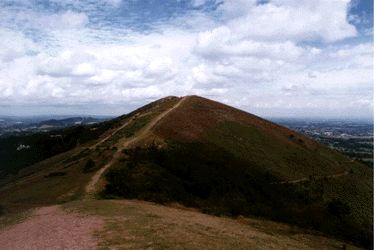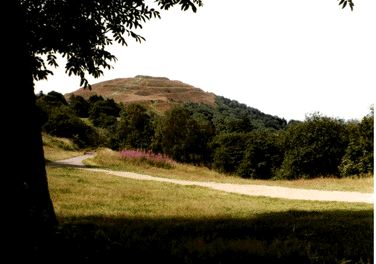 He once said to a friend "If ever after I'm dead you hear a little tune amongst the bracken on these Hills, don't be frightened as it will only be me humming the opening bars of my 'Cello Concerto". And while living at Malvern he composed many of his most famous works - The 'Enigma' Variations, the Pomp and Circumstance March No.1 ("Land of Hope and Glory") and The Dream of Gerontius.
He once said to a friend "If ever after I'm dead you hear a little tune amongst the bracken on these Hills, don't be frightened as it will only be me humming the opening bars of my 'Cello Concerto". And while living at Malvern he composed many of his most famous works - The 'Enigma' Variations, the Pomp and Circumstance March No.1 ("Land of Hope and Glory") and The Dream of Gerontius.
He was a keen cyclist who used to ride the lanes around Malvern while seeking musical inspiration. At the Birthplace Museum can be seen an Ordnance Survey map which he had taken with him on one of his cycling expeditions and on the back of which he had pencilled some musical ideas that had occurred to him as he cycled along. A friend wrote: "There cannot have been a lane within 20 miles of Malvern that we did not ultimately find. Much of Edward's music is closely connected with the places he visited, for, as we rode he would often become silent and I knew that some new melody or, more probably, some new piece of orchestral texture, had occurred to him."
 Near the southern end of the Malvern Hills is the Herefordshire Beacon, or 'British Camp' as it is called on account of the series of easily-seen ramparts and defensive ditches at its summit and which date back to the Iron Age. Here, according to local legend, the British leader Caractacus defended the fortress against the invading Roman army.
Near the southern end of the Malvern Hills is the Herefordshire Beacon, or 'British Camp' as it is called on account of the series of easily-seen ramparts and defensive ditches at its summit and which date back to the Iron Age. Here, according to local legend, the British leader Caractacus defended the fortress against the invading Roman army.
It was this legend which inspired Elgar to write his cantata 'Caractacus' following a visit to see his mother who was staying at the near-by village of Colwall. Looking across at the earthworks of the British Camp, Ann Elgar said "Can't we write some tale about it...?" Thus inspired, Elgar composed his cantata in time for the Leeds Festival in October 1898.
More recent archaeological research, however, has shown that the actual site of Caractacus' battle with the Romans took place outside the area and not, therefore, on the British Camp.
 Return to the Tour Index
Return to the Tour Index